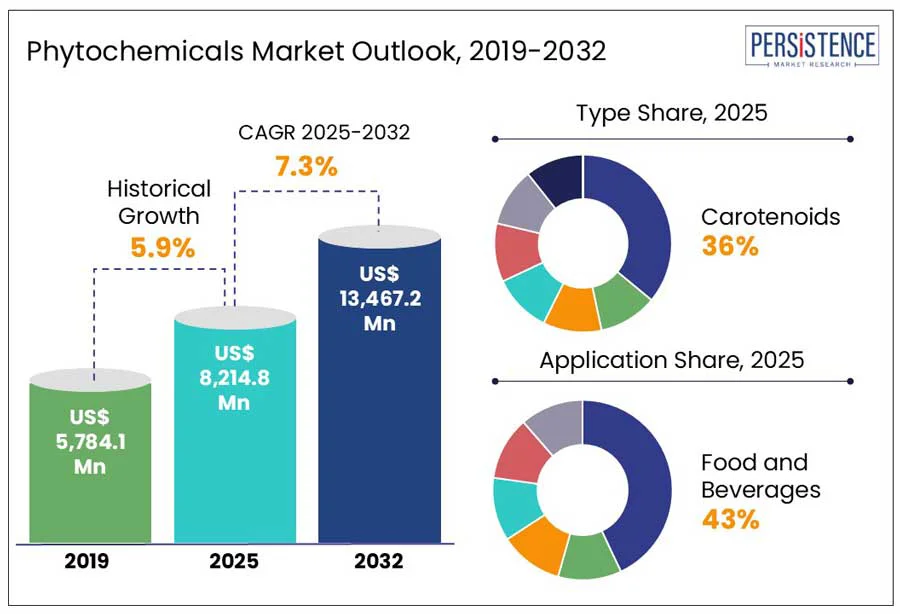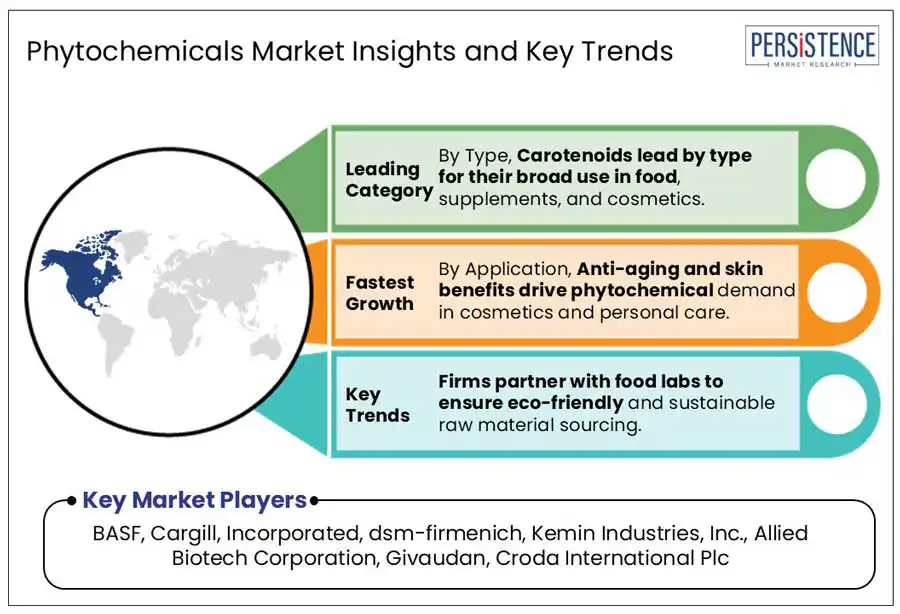ID: PMRREP29875| 197 Pages | 20 May 2025 | Format: PDF, Excel, PPT* | Food and Beverages

The global phytochemicals market size is estimated to grow from US$ 8,214.8 million in 2025 to US$ 13,467.2 million by 2032. The market is projected to record a CAGR of 7.3% during the forecast period from 2025 to 2032. According to the Persistence Market Research report, the industry is poised for robust growth, driven by increasing consumer demand for natural, plant-based ingredients, expanding applications in cosmetics and functional foods, and ongoing investments in advanced extraction technologies, strategic partnerships, and clean-label product innovation across developed and emerging markets.

Key Industry Highlights:
|
Global Market Attribute |
Key Insights |
|
Global Phytochemicals Market Size (2025E) |
US$ 8,214.8 Mn |
|
Market Value Forecast (2032F) |
US$ 13,467.2 Mn |
|
Projected Growth (CAGR 2025 to 2032) |
5.9% |
|
Historical Market Growth (CAGR 2019 to 2024) |
7.3% |
The surging demand for functional beverages and plant-based diets is significantly driving the phytochemicals market. Consumers are increasingly shifting toward healthier eating habits, favoring naturally sourced ingredients over synthetic additives. This shift is largely influenced by rising health consciousness and awareness of the adverse effects of chemical additives. Phytochemicals, with their natural antioxidant properties, are becoming popular for their ability to enhance the shelf-life and safety of food products, particularly in beverages, dairy, and plant-based food applications. Their multifunctional benefits ranging from flavor enhancement and color stability to oxidative protection and nutritional enrichment are making them ideal ingredients in the functional food and beverage sector. As consumers prioritize clean-label products and natural nutrition, phytochemicals are emerging as essential components to meet evolving market demands for wellness-focused, plant-based dietary solutions.
High production costs, stemming from complex extraction processes, significantly hinder the industry growth. The isolation and purification of bioactive compounds from plant sources require advanced technologies, substantial raw material input, and energy-intensive procedures. Techniques such as supercritical fluid extraction, solvent extraction, and chromatography necessitate high capital investments and operational costs, which make the final products expensive. Additionally, fluctuations in plant yields, seasonal availability, and the need for stringent quality control further exacerbate production costs. These challenges make it difficult for small and medium-sized manufacturers to enter or remain in the market, ultimately limiting the scalability and affordability of phytochemical-based products in the food, pharmaceutical, and cosmetic industries.
The growing incorporation of phytochemicals in cosmetics and skincare products presents significant market opportunities, driven by increasing consumer awareness of ingredient transparency and preference for natural, clean-label formulations. Phytochemicals offer multifunctional benefits such as moisturizing, anti-inflammatory, antioxidant, and anti-aging properties, making them highly valuable in personal care applications. For instance, extracts from Lagerstroemia speciosa and Lagerstroemia floribunda are widely used in anti-aging skincare formulations due to their efficacy in improving skin elasticity and reducing wrinkles. Additionally, innovations like Bio-Saponins™, a product by Bio-Botanica, Inc., showcase the functional versatility of phytochemicals. Bio-Saponins™ offers gentle foaming, natural emulsification, and mild cleansing properties enhancing performance in soaps, shampoos, lotions, and body washes while aligning with the growing demand for sustainable and plant-based cosmetic solutions.
With approximately 36% market share, carotenoids lead the industry due to their extensive application across food, dietary supplements, and cosmetics. Carotenoids such as beta-carotene, lutein, and lycopene play a critical role in enhancing immune function, protecting against cellular damage, and supporting eye and skin health. Their natural coloring properties make them a preferred ingredient in food and beverage products, particularly as consumers shift away from synthetic additives. Alongside carotenoids, flavonoids, and polyphenols are also gaining traction. Flavonoids offer anti-inflammatory and cardiovascular benefits, while polyphenols support gut health and blood sugar control. Together, these compounds drive demand in clean-label, functional products, further solidifying carotenoids' market leadership shaped by wellness trends and natural ingredient adoption.
The cosmetics and personal care segment is projected to grow at a CAGR of 7.9% during the forecast period from 2025 to 2032. Consumers are increasingly favoring natural, plant-based ingredients for maintaining skin health, reducing wrinkles, and enhancing radiance. Phytochemicals, such as flavonoids and polyphenols, offer antioxidant, anti-inflammatory, and moisturizing properties, making them ideal for skincare formulations. In the pharmaceutical industry, phytochemicals are gaining popularity for their therapeutic benefits, including immune modulation, anti-cancer activity, and support for cardiovascular health. Additionally, in the nutraceutical sector, they are commonly used in dietary supplements to enhance metabolic health, improve digestion, and help prevent chronic diseases. The multifunctional nature of phytochemicals is driving growth across these sectors, aligning with global trends in clean-label products, wellness, and preventive healthcare.

The North America Phytochemicals Market is witnessing significant growth as the well-established food and beverage industry is incorporating phytochemicals into functional products to meet the rising demand from health-conscious consumers. Strong regulatory frameworks in the region support well-being and encourage the use of natural, plant-based ingredients. In Canada, consumers are increasingly seeking natural and clean-label products, further fueling market expansion. Collaborations between companies and research laboratories are enhancing product development, especially in functional foods and nutraceuticals. Additionally, private equity firms in the U.S. are making substantial investments in innovative and scalable brands within the cosmetics and personal care sectors, where phytochemicals are gaining popularity for their skin-enhancing and anti-aging benefits. This trend reinforces North America's leadership in this evolving market.
The European phytochemicals market is experiencing significant growth due to a strong shift toward plant-based foods and healthier lifestyles. An increasing number of consumers are adopting vegan diets, supported by active organizations and alliances promoting the vegan movement across the region. Countries such as the U.K., Germany, Spain, France, and Italy. are witnessing a rise in spending on nutraceuticals and dietary supplements, further driving demand for products rich in phytochemicals. There has also been a noticeable increase in food and beverage offerings made from natural and organic ingredients, catering to health-conscious individuals. Additionally, consumer preference for herbal and botanical supplements is growing, further contributing to the market's expansion. These trends reflect a broader commitment in Europe to natural wellness solutions and sustainable consumption patterns.
The global phytochemical market is highly fragmented, with numerous players competing across different regions and sectors. Key players are focusing on customized blends and formulations to meet the specific needs of functional foods, supplements, and cosmetics. Strategic partnerships in research and distribution are becoming essential to stay competitive. As applications widen across nutraceuticals, personal care, food, and pharmaceuticals, players are expanding internationally, often setting up new manufacturing and processing facilities. Governments are also supporting through research grants and initiatives that promote natural, plant-based ingredients. These combined efforts are aligning well with the rising consumer demand for clean-label, natural, and wellness-oriented products.
The global phytochemicals market is projected to be valued at US$ 8,214.8 Mn in 2025.
Surging demand for functional beverages and plant-based diets is driving phytochemical demand.
The Global Phytochemicals market is expected to witness a CAGR of 7.3% between 2025 and 2032.
The Growing incorporation of phytochemicals in cosmetics and skincare products presents significant market opportunities for companies in the market.
Major players in the global phytochemicals market include BASF, Cargill, Incorporated, dsm-firmenich, Kemin Industries, Inc., Allied Biotech Corporation, Givaudan, Croda International Plc, and others.
|
Report Attribute |
Details |
|
Historical Data/Actuals |
2019 - 2024 |
|
Forecast Period |
2025 - 2032 |
|
Market Analysis |
Value: US$ Mn |
|
Geographical Coverage |
|
|
Segmental Coverage |
|
|
Competitive Analysis |
|
|
Report Highlights |
|
|
Customization and Pricing |
Available upon request |
By Type
By Form
By Application
By Region
Delivery Timelines
For more information on this report and its delivery timelines please get in touch with our sales team.
About Author